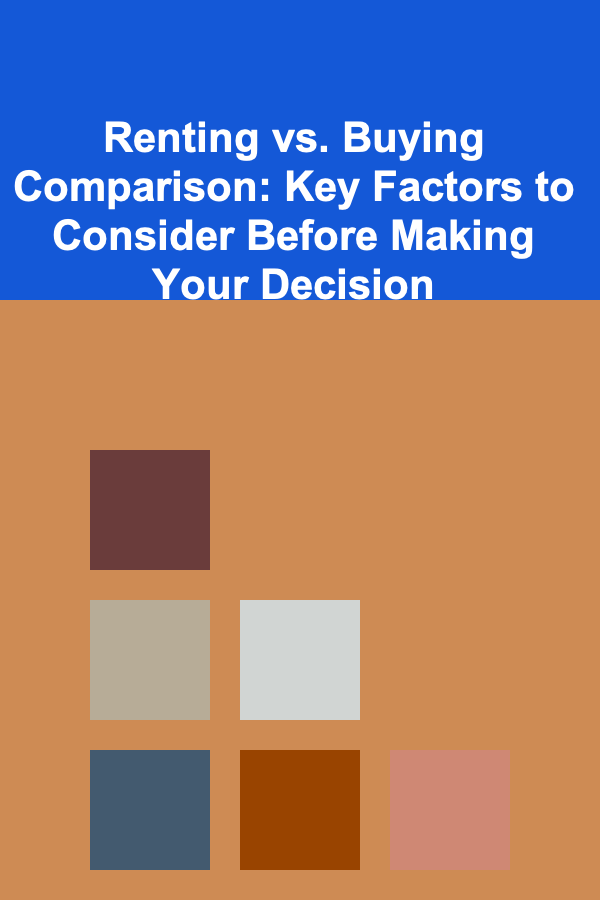
Renting vs. Buying Comparison: Key Factors to Consider Before Making Your Decision
ebook include PDF & Audio bundle (Micro Guide)
$12.99$6.99
Limited Time Offer! Order within the next:

Deciding whether to rent or buy a home is one of the most significant financial decisions many people will make in their lifetime. Both options come with their own set of advantages, challenges, and long-term implications, which makes the decision complex and deeply personal. Whether you're a first-time homebuyer or a long-term renter, understanding the key factors involved in this decision is crucial to making an informed choice.
In this guide, we'll explore the major factors you should consider before making the choice between renting and buying a home, offering actionable insights for both scenarios. This in-depth analysis will help you evaluate your financial situation, lifestyle preferences, long-term goals, and market conditions to decide which option is the best for you.
Financial Considerations
Initial Cost and Down Payment
One of the most immediate differences between renting and buying a home is the upfront financial commitment. When you buy a home, the initial costs are generally much higher due to the down payment, closing costs, and other associated fees.
- Renting: The upfront cost is typically limited to a security deposit (often one or two months' rent) and possibly the first month's rent. This can make renting a much more affordable short-term option, especially for those who don't have substantial savings or are still building their credit.
- Buying: When purchasing a home, you'll need a down payment, which typically ranges from 3% to 20% of the home's purchase price, depending on your loan type and creditworthiness. In addition to the down payment, there are closing costs, which can include fees for appraisals, inspections, and legal services. For many, these costs can be a significant barrier to homeownership.
Monthly Payments and Affordability
The cost of renting versus buying can vary greatly depending on the local real estate market, but in general, buying may involve higher monthly payments, at least initially.
- Renting: Rent payments are usually fixed for the length of the lease, providing predictable monthly costs. Rent may increase at the end of each lease term, depending on the rental market, but these increases tend to be moderate compared to the potential fluctuations in mortgage rates.
- Buying: Monthly mortgage payments can be higher than rent payments, particularly if you've put down a smaller down payment. Additionally, homeowners must factor in property taxes, homeowners insurance, and maintenance costs, which can further elevate monthly expenses. However, mortgage payments can be more predictable than rent in the long term, especially if you have a fixed-rate mortgage.
Building Equity vs. Paying Rent
One of the most compelling reasons to buy a home is the potential to build equity over time.
- Renting: Rent payments do not contribute to ownership or equity. You're essentially paying for the use of the property without any return on your investment.
- Buying: With each mortgage payment, you gradually build equity in the home. Over the years, this equity can be tapped into for things like home improvements or as a down payment on your next property. Furthermore, if property values rise, the value of your home can increase, giving you an even greater return on investment.
Stability and Long-Term Planning
Stability and Predictability
- Renting: Renting offers flexibility and predictability in terms of cost. Lease terms are typically one year, and once that lease ends, you have the option to move or renegotiate the lease. However, renters are subject to the landlord's decisions regarding rent increases and lease renewals. In markets with low vacancy rates, landlords may increase rent prices significantly, which could lead to financial strain.
- Buying: Homeownership offers greater stability. If you have a fixed-rate mortgage, your monthly payments will remain consistent for the life of the loan. Additionally, homeowners are insulated from rent hikes, which can be particularly beneficial in markets where rent prices are rising rapidly.
However, homeownership can sometimes come with risks of its own, particularly in volatile markets where home values fluctuate. A drop in property value may lead to financial loss, but the risk of rent increases remains a bigger concern for renters in many areas.
Commitment to a Location
- Renting: Renting allows greater mobility, which is ideal for individuals who expect to move frequently for work, family, or lifestyle reasons. You're not tied down to a particular location, and the process of moving from one rental property to another is relatively simple and quick.
- Buying: Purchasing a home requires a long-term commitment to a specific location. Moving a home is not an option, and the process of selling a home and finding a new one can be time-consuming and expensive. If you foresee significant changes in your career or personal life that could require relocating, renting may be a better option.
Maintenance and Responsibility
Maintenance Costs and Responsibilities
- Renting: One of the key benefits of renting is that the landlord is generally responsible for the upkeep and maintenance of the property. If something breaks down (like the HVAC or plumbing), it's the landlord's responsibility to repair or replace it. This can be a significant cost-saving for renters.
- Buying: As a homeowner, you are fully responsible for maintenance, repairs, and renovations. While this allows you to make changes and updates to your property, it also means you're on the hook for any necessary repairs. Homeowners should budget for regular maintenance, unexpected repairs, and long-term improvements to maintain the property's value.
Property Upkeep and Customization
- Renting: Renters typically cannot make substantial changes to the property without the landlord's approval. This limits the ability to customize the space to personal taste, whether that means painting the walls or renovating the kitchen.
- Buying: Homeowners have complete freedom to personalize and renovate their property. This flexibility can be a huge advantage for those who want to create a living space that fits their lifestyle and preferences.
Real Estate Market Trends
The condition of the real estate market in your area can have a significant impact on whether renting or buying is a better option.
Buyer's Market vs. Seller's Market
- Renting: Renters are less affected by market conditions since their monthly costs are relatively fixed by their lease agreement. If the housing market is experiencing a downturn, renting may be a safer option since home values could drop, leading to potential financial loss for buyers.
- Buying: In a buyer's market (when there are more homes for sale than buyers), purchasing a home may be an excellent opportunity to secure a property at a lower price. Conversely, in a seller's market (when demand exceeds supply), home prices may be inflated, making it less advantageous to buy, particularly if you're trying to get a good deal.
Interest Rates and Financing
Mortgage interest rates are another key factor in determining whether buying a home is financially advantageous. Low-interest rates make home buying more attractive, as they reduce the long-term cost of a mortgage.
However, if interest rates are high, the cost of borrowing increases, and buying a home may be less appealing. Renters, on the other hand, are not directly affected by interest rates since they don't need to take out a mortgage.
Lifestyle Preferences
Flexibility vs. Stability
- Renting: Renting offers significant flexibility. If your work requires you to move often or if you prefer to keep your options open, renting allows you to adapt more easily to changing circumstances. It also means you're not tied down by the responsibilities of homeownership.
- Buying: Buying a home offers stability and permanence. It's ideal for individuals or families who want to settle down in one location, build community ties, and invest in a property over time.
Social and Emotional Considerations
- Renting: Renting may feel like a temporary solution, and for some, it may lack the sense of ownership and pride that comes with homeownership. However, renting can offer peace of mind, as renters are not responsible for the long-term upkeep and investment risk associated with owning a home.
- Buying: Owning a home can be deeply satisfying, offering a sense of pride and accomplishment. It also allows you to establish roots in a community, customize your living space, and enjoy the financial benefits of equity building over time.
Tax Considerations
- Renting: Renters typically cannot deduct rent payments on their taxes. However, some areas may offer property tax rebates or rental assistance programs that can help alleviate the cost of rent.
- Buying: Homeowners may qualify for various tax deductions, including the mortgage interest deduction and property tax deductions. These tax benefits can make homeownership more affordable, especially in the early years of a mortgage.
Conclusion
The decision to rent or buy a home is a deeply personal one, influenced by a variety of financial, lifestyle, and market factors. There is no one-size-fits-all answer, and the best option will depend on your individual circumstances, financial situation, and long-term goals.
- If you prioritize flexibility, lower upfront costs, and less responsibility for maintenance, renting may be the better option.
- If you're looking for long-term stability, the opportunity to build equity, and the ability to customize your living space, buying a home might be the right choice.
Regardless of your decision, it's important to carefully evaluate your options, seek professional advice when necessary, and make a choice that aligns with both your current situation and future aspirations.
Other Products

How to Clean Your Microwave in Just Minutes
Read More
How to Decorate Your Bedroom on a Budget for Maximum Comfort
Read More
How to Keep Kids Entertained with Craft Projects at Home
Read More
How to Organize Important Documents for Quick Access
Read More
How to Sell Handmade Soap Through an Online Shop: A Detailed Actionable Guide
Read More